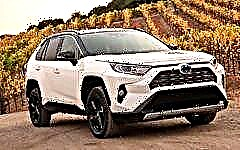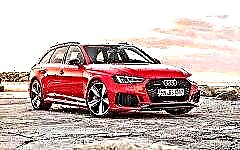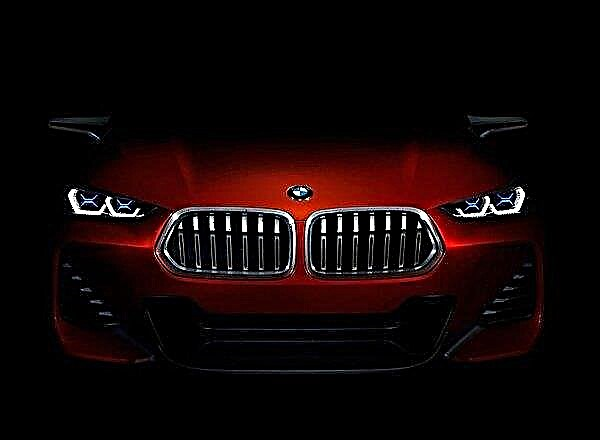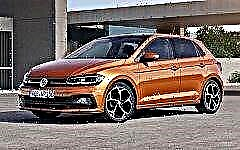

The content of the article:
- The most economical Volkswagens
In order to be spent on fuel to a minimum, the easiest way is to buy an economical car that will consume this very fuel in small volumes. Modern cars, without any hybrid installations at the same time, in highway conditions can consume a little more than three liters per 100 kilometers. And this does not apply to small cars at all.
Today, an economical car can be either a roomy sedan or a premium car. How the German automobile concern can please its buyer in this regard and which VWs for 2019 are considered the most economical - in our review.
The most economical Volkswagens
VW Polo

I would like to start with the economical and reliable Volkswagen Polo, which can boast not only of its reliability, but also of its economy. Our customer especially liked it for its high ground clearance, which makes it ideal for Russian roads.
Until recently, the car was equipped exclusively with a 1.6-liter engine and a capacity of 85 and 105 forces. In 2015, it underwent a restyling, due to which the engine power increased by 5 liters. with. GT sedan with a 1.4-liter turbocharged engine and a capacity of 125 hp. was introduced only recently.
The manufacturer also provided several trim levels, but despite the list of equipment and different curb weights, the Polo's fuel consumption has not changed.
The version with a 1.6 liter 110 hp power unit consumes the least fuel. and a manual transmission. In the extra-urban cycle, fuel consumption per 100 km is only 4 liters. In the combined cycle, we also see good results - 5.7 liters. Within the city, consumption increases to 7.8 liters.
Then there are versions with a 1.4 liter engine. and a capacity of 125 "horses", where with a manual transmission the fuel consumption is 4.7 liters outside the city, and with an automatic gearbox - 4.8 liters. In the urban cycle, the indicators are as follows - 7.3 and 7.5 liters of fuel, respectively.
The highest consumption is obtained in the version with a 1.6 liter engine producing 105 hp. and an automatic transmission. Outside the city, fuel consumption is 5.4 liters, in the city - almost 10 liters, and in the combined cycle - exactly 7 liters.
Volkswagen Golf

One of the few cars of the German automotive concern, which is very successfully sold not only in our market, but also abroad.
I would like to say a special thank you to the engineers, because during the development of the VW Golf absolutely all the details that are important for the average consumer were taken into account. Reliability and high German quality only increase the interest of car owners in this model.
But we are interested in something else, namely, fuel consumption. The lowest rates are for the Golf 7 1.2 MT version. In the extra-urban cycle, only 4.2 liters of fuel are required per 100 km of track, in the urban and mixed cycle - 5.9 and 4.9 liters, respectively.
The second line of the rating is occupied by the Golf 3-door 1.4 TSI DSG version, where fuel consumption per 100 kilometers in the suburban, urban and combined cycles is 4.3, 6.2 and 5.0 liters, respectively.
“Bronze” was awarded to a close relative of the silver medalist Golf 3-door 1.4 TSI MT. In the combined cycle, fuel consumption here is only 5.2 liters, and in urban and suburban - 6.6 and 4.3 liters, respectively.
Here are a few more points that might be of interest to a potential buyer interested in a VW Golf:
- The car comes in two trim levels. The difference between them lies only in the suspension - one is standard, the second is fully adapted to Russian realities, so the roadbed of poor quality for VW Golf will not be an unpleasant surprise.
- Two versions of the power unit. The volume of the engine on gasoline is from 1.2 to 2 liters. The diesel engine is only available in a 2 liter version.
- There is a version with front-wheel drive and all-wheel drive.
- Transmission - manual transmission and automatic transmission. In the Russian market, the most popular version is with the automatic transmission.
VW Golf itself is not only economical, but also reliable and comfortable.
Volkswagen Jetta

Remember when we talked about how premium cars can be fuel efficient too? So, the VW Jetta sedan is fully consistent with this.
In addition to low fuel consumption, the car has another important advantage, namely, an excellent chassis, due to which the car's handling improves several times.
When compared with other models of the German automaker, VW Jetta is much cheaper. Combined with reliability, high levels of comfort and economy, the Jetta has become incredibly popular in the market.
But what about fuel consumption? Here Jetta has the following indicators:
- First place: VW Jetta 1.4 TSI with DSG gearbox. Consumption in the city, in the combined cycle and outside the city is 5.0, 7 and 6.0 liters, respectively.
- Second place: VW Jetta 1.4 TSI MT. Consumption within the city, in the combined cycle and outside the city is 5.1, 8.2 and 6.2 liters, respectively.
- Third place: VW Jetta 1.4 TSI with DSG 150 Hp. In the city, the consumption is 7.5 liters, outside the city - 5.2 liters, and in the combined cycle - exactly 6 liters.
The Jetta is a very comfortable sedan. Its latest update also affected the wheelbase, thanks to which there is much more free space inside. This is best felt from behind. It used to be a bit cramped there, but now it's just right.
The main thing is that such changes did not affect the driver and front passenger in any way. In front of the place has not decreased by a millimeter.
The basic version of the sedan has received a lot of useful options, but the standard version has acquired a high-quality multimedia system with a large touch screen. Choosing the most economical version of the sedan, you should not lose sight of its diesel version. First of all, it attracts with its low fuel consumption.
VW Passat

Wondering why we included this midsize five-door sedan in today's top? No wonder, because there are two versions here that deserve special attention and are fully consistent with our today's topic. We are talking about the VW Passat B5 1.9 TDI Syncro, where fuel consumption in the suburban, urban and combined cycles is only 4.7, 7y6 and 6.4 liters, respectively. For such a powerful German hero, the indicators are very pleasing.
The second version that I would like to draw your attention to is VW Passat B6 Variant 1.4 TSI MT. In the city, fuel consumption is 8.5 liters per 100 km, and in the suburban and combined cycles - only 5.5 and 6.6 liters, respectively.
We are fully of the opinion that the Passat can be called the hallmark of the entire German automobile concern. Prestigious appearance, good interior trim, ergonomics, high level of comfort, and now excellent economy make this car even more popular and desirable.
VW Tiguan

As in the case of the previous candidate in our top, the VW Tiguan crossover cannot boast of great efficiency, but there are two versions of it that we simply could not ignore. Besides, lovers of comfortable all-terrain vehicles should understand what to choose if they need to choose an economical "horse":
- Volkswagen Tiguan 2.0 TDI 4Motion AT (diesel version). Consumption in the city is slightly more than 9 liters, in the combined cycle - 7.1 liters, but in the suburban cycle it is only 5.9 liters per 100 kilometers.
- Volkswagen Tiguan 2.0 TDI 4Motion MT. Fuel consumption per 100 km in the city, in the suburban and combined cycles is 10.1, 6.7 and 8.0 liters, respectively.
The petrol version of the car is equipped with a 1.4-liter unit with a capacity of 170 liters. The diesel version received at its disposal a two-liter unit with a capacity of 140 "horses". The gearbox in this case will be automatic.
By the way, recently the German automaker presented its most economical crossover VW T-Cross 2019. This is the smallest SUV in the entire model line of this brand. The company said that the car received in addition another very economical diesel engine.It is stated that in the combined mode, the fuel consumption of the crossover will be only 5.3 liters per 100 kilometers.
Summing up
It's hard to say who became the leader of our top. It should be borne in mind that VW cars are not the most economical transport that can be found on the market. Of course, if you do not take into account the International Exhibition in Frankfurt, where Volkswagen demonstrated the BlueMotion models, where even the VW Polo's fuel consumption starts at 3.3 liters per 100 kilometers.
The company relies on power and comfort, but at the same time it does not forget to take into account the needs of the average buyer, for whom the opportunity to save on fuel for their car is a priority.











